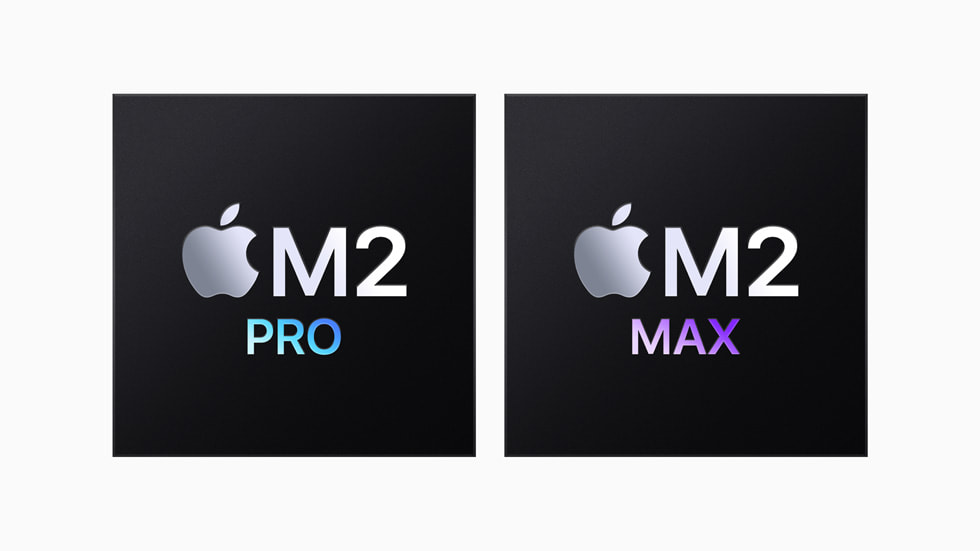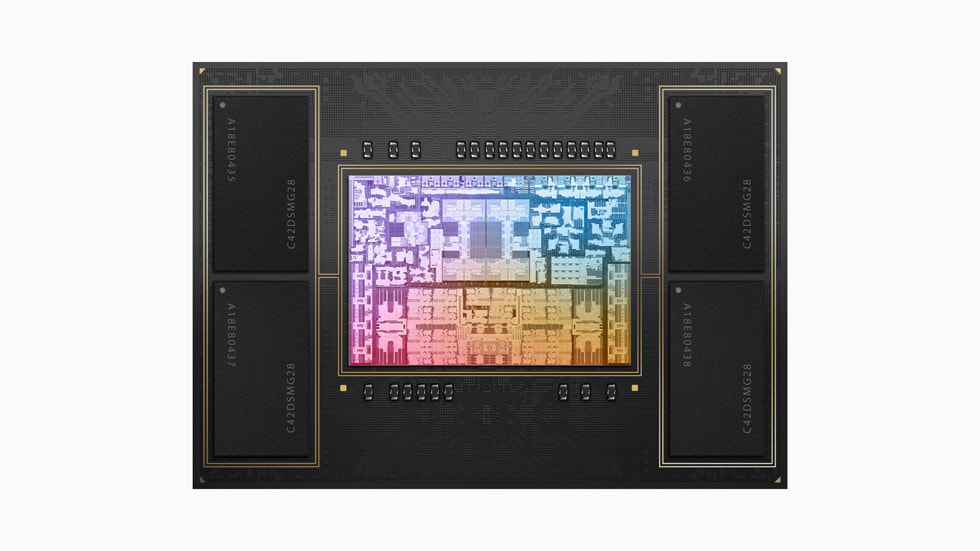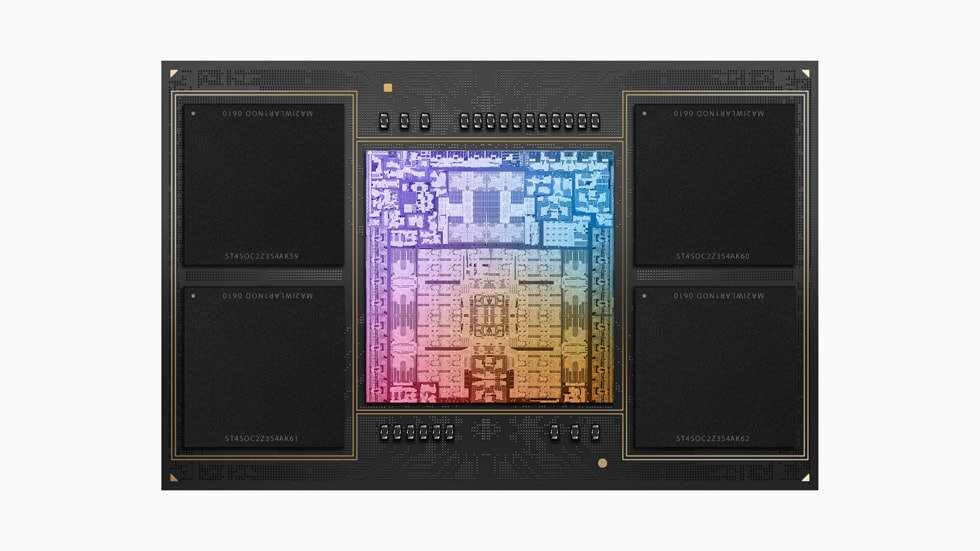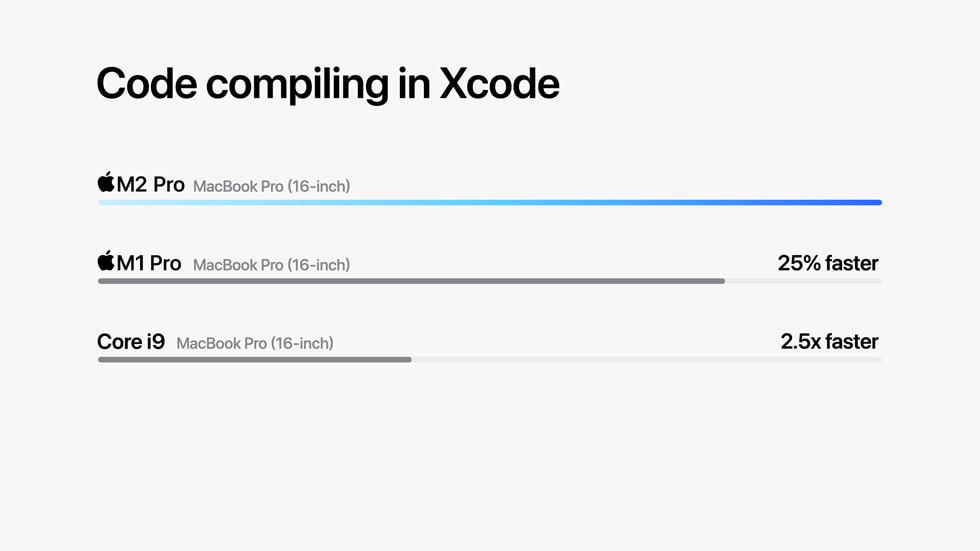PRESS RELEASE
17 January 2023
Apple unveils M2 Pro and M2 Max: next-generation chips for next-level workflows
Supercharging MacBook Pro and Mac mini, M2 Pro and M2 Max feature a more powerful CPU and GPU, up to 96GB of unified memory, and industry-leading power efficiency
CUPERTINO, CALIFORNIA Apple today announced M2 Pro and M2 Max, two next-generation SoCs (systems on a chip) that take the breakthrough power-efficient performance of Apple silicon to new heights. M2 Pro scales up the architecture of M2 to deliver an up to 12-core CPU and up to 19-core GPU, together with up to 32GB of fast unified memory. M2 Max builds on the capabilities of M2 Pro, including an up to 38-core GPU, double the unified memory bandwidth, and up to 96GB of unified memory. Its industry-leading performance per watt makes it the world’s most powerful and power-efficient chip for a pro laptop. Both chips also feature enhanced custom technologies, including a faster 16-core Neural Engine and Apple’s powerful media engine. M2 Pro brings pro performance to Mac mini for the first time, while M2 Pro and M2 Max take the game-changing performance and capabilities of the 14-inch and 16-inch MacBook Pro even further.
“Only Apple is building SoCs like M2 Pro and M2 Max. They deliver incredible pro performance along with industry-leading power efficiency,” said Johny Srouji, Apple’s senior vice president of Hardware Technologies. “With an even more powerful CPU and GPU, support for a larger unified memory system, and an advanced media engine, M2 Pro and M2 Max represent astonishing advancements in Apple silicon.”
M2 Pro: Next-Generation Performance for Pro Workflows
Built using a second-generation 5-nanometer process technology, M2 Pro consists of 40 billion transistors — nearly 20 percent more than M1 Pro, and double the amount in M2. It features 200GB/s of unified memory bandwidth — twice that of M2 — and up to 32GB of low-latency unified memory. The next-generation 10- or 12-core CPU consists of up to eight high-performance cores and four high-efficiency cores, resulting in multithreaded CPU performance that is up to 20 percent faster than the 10-core CPU in M1 Pro. Apps like Adobe Photoshop run heavy workloads faster than ever, and compiling in Xcode is up to 2.5x faster than on the fastest Intel-based MacBook Pro.1
The GPU in M2 Pro can be configured with up to 19 cores — three more than the GPU in M1 Pro — and includes a larger L2 cache. Graphics speeds are up to 30 percent faster than that of M1 Pro, resulting in huge increases in image processing performance and enabling console-quality gaming.
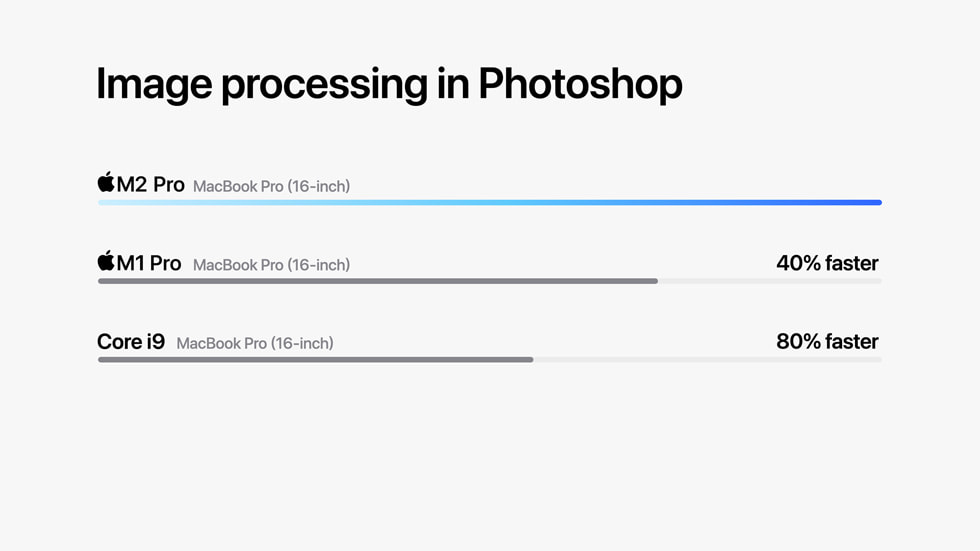
M2 Max: The World’s Most Powerful and Efficient Chip for a Pro Laptop
With 67 billion transistors — 10 billion more than M1 Max and more than 3x that of M2 — M2 Max pushes the performance and capabilities of Apple silicon even further. Its 400GB/s of unified memory bandwidth is twice that of M2 Pro, 4x that of M2, and supports up to 96GB of fast unified memory. So massive files open instantaneously, and working across multiple pro apps is incredibly quick and fluid.
M2 Max features the same next-generation 12-core CPU as M2 Pro. The GPU is even more powerful with up to 38 cores, and is paired with a larger L2 cache. Graphics speeds climb up to 30 percent faster than M1 Max. Along with 96GB of memory, the new MacBook Pro with M2 Max can tackle graphics-intensive projects that competing systems can’t even run.2 From powering visual effects, to training machine learning models, to stitching together gigapixel images, MacBook Pro with M2 Max brings incredible performance whether plugged in or running on battery power. M2 Max is the world’s most powerful and efficient chip for a pro laptop.
Extending Capabilities with Custom Technologies
M2 Pro and M2 Max feature updated custom technologies:
- Both M2 Pro and M2 Max include Apple’s next-generation, 16-core Neural Engine, capable of 15.8 trillion operations per second, and up to 40 percent faster than the previous generation.
- M2 Pro has an immensely powerful and efficient media engine, including hardware-accelerated H.264, HEVC, and ProRes video encode and decode, allowing playback of multiple streams of 4K and 8K ProRes video while using very little power. M2 Max features two video encode engines and two ProRes engines, bringing up to 2x faster video encoding than M2 Pro.
- Apple’s latest image signal processor delivers better noise reduction and, along with the Neural Engine, uses computational video to enhance camera image quality.
- A next-generation Secure Enclave is a critical part of Apple’s best-in-class security.
macOS Ventura with M2 Pro and M2 Max
macOS has been designed for Apple silicon, and the combination of macOS Ventura and industry-leading new chips delivers unbeatable performance and productivity for users. Mac computers powered with Apple silicon have access to more than 15,000 native apps and plug-ins that unlock the full power of M-series chips.
macOS Ventura brings new features including Stage Manager, and new capabilities with Continuity Camera and Handoff in FaceTime. macOS Ventura also includes big updates to Safari, Mail, Messages, Spotlight, and more, all of which are more responsive and run efficiently on M2 Pro and M2 Max.
Apple Silicon and the Environment
M2 Pro and M2 Max help the new MacBook Pro and Mac mini meet Apple’s high standards for energy efficiency. The power-efficient performance of Apple silicon helps the new MacBook Pro achieve the longest battery life ever in a Mac — up to 22 hours.3 This results in less time needing to be plugged in and less energy consumed over its lifetime.
Today, Apple is carbon neutral for global corporate operations, and by 2030, plans to have net-zero climate impact across the entire business, which includes manufacturing supply chains and all product life cycles. This means that every chip Apple creates, from design to manufacturing, will be 100 percent carbon neutral.
Share article
Media
-
Text of this article
-
Images in this article
- Results are compared to previous-generation 2.4GHz 8-core Intel Core i9-based 16-inch MacBook Pro systems with Radeon Pro 5600M graphics with 8GB HBM2, 64GB of RAM, and 8TB SSD.
- Testing was conducted by Apple in November and December 2022 using preproduction 16-inch MacBook Pro systems with Apple M2 Max, 12-core CPU, 38-core GPU, 96GB of RAM, and 8TB SSD, as well as a production Intel Core i9-based PC system with NVIDIA Quadro RTX 6000 graphics with 24GB GDDR6 and the latest version of Windows 11 Pro available at the time of testing, and a production Intel Core i9-based PC system with NVIDIA GeForce RTX 3080 Ti graphics with 16GB GDDR6 and the latest version of Windows 11 Home available at the time of testing. OTOY Octane X 2022.1 on preproduction 16-inch MacBook Pro systems and OTOY OctaneRender 2022.1 on Windows systems were tested using a scene that requires over 40GB of graphics memory when rendered. Performance tests are conducted using specific computer systems and reflect the approximate performance of MacBook Pro.
- Testing was conducted by Apple in November and December 2022 using preproduction 16-inch MacBook Pro systems with Apple M2 Pro, 12-core CPU, 19-core GPU, 16GB of RAM, and 1TB SSD. The Apple TV app movie playback test measures battery life by playing back HD 1080p content with display brightness set to eight clicks from the bottom. Battery life varies by use and configuration. See apple.com/hk/en/batteries for more information.
